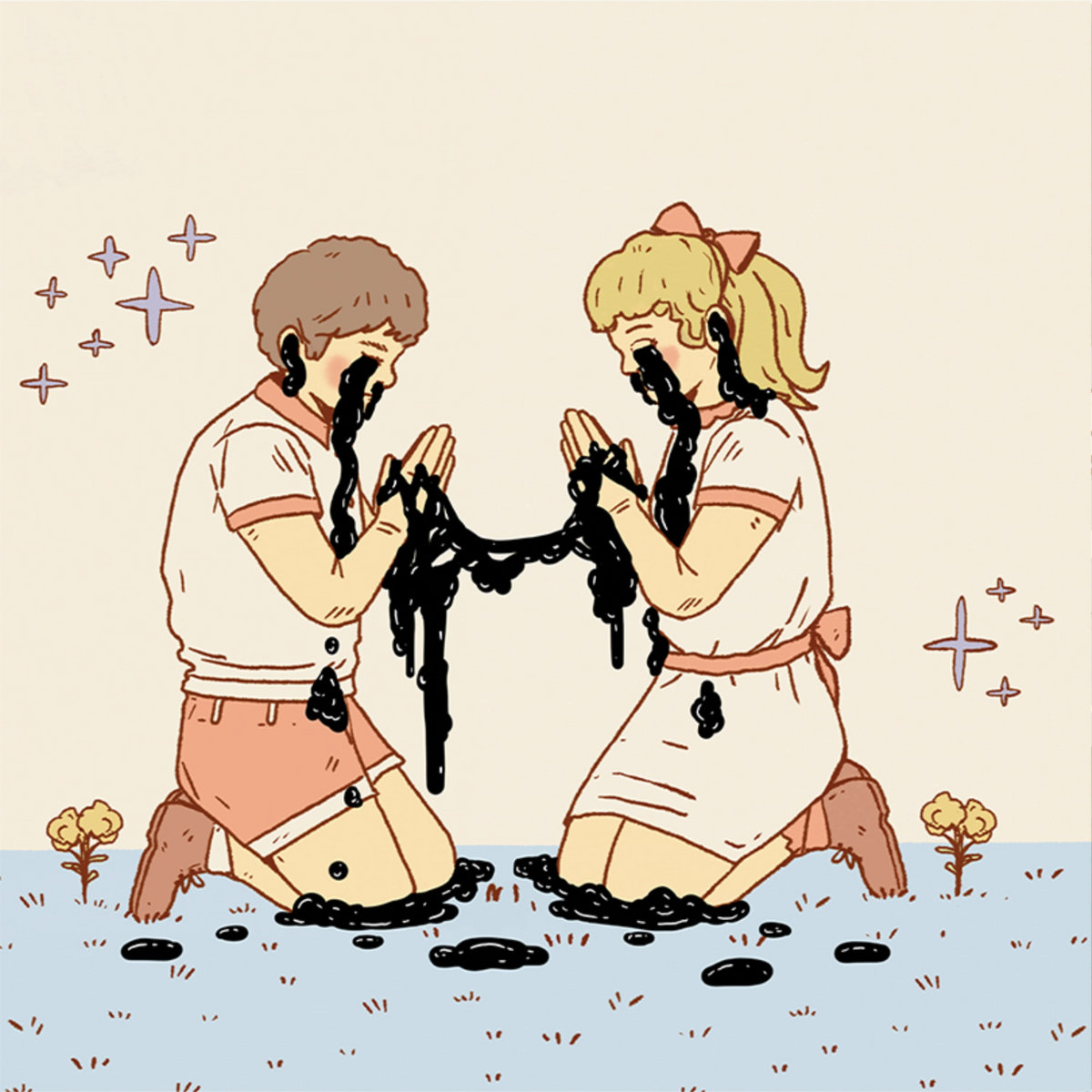The Divine Refuge of Welcome to Conceptual Beach
/Where do you go when you need an escape? It was probably easier to answer that question before 2020, but that’s what makes the concept of personal sanctuary all the more essential right now. Between the ongoing global pandemic, a just-now-ramping-up election cycle, and a fascist government that’s systematically brutalizing and murdering its own citizens, most days it feels like there’s abject horror in every conceivable direction.
Some days the scale of pain and unrest is too much to bear; it’s unending and feels like it’s only getting worse. While everything I’ve just listed is a fact of day-to-day life in 2020, it’s important to counter that sense of grief and hopelessness with something, anything, to keep yourself going. We’ve reached a point where it’s simultaneously ‘every man for himself’ and ‘we’re all in this together.’ You have to find your escape and hold onto it for dear life while also keeping close to the people you love to make sure they’re doing the same.
Taking a break from the always-on rage-filled indignance of the world has transformed from a skill to a necessity over the past few months. Finding the balance between staying informed, using your voice, and taking time to unplug is an invaluable skill that’s nothing short of essential in 2020. On Welcome to Conceptual Beach, Young Jesus use lush instrumentation, dreamlike lyrics, and wandering improvisational passages to depict the ethereal world that lead singer John Rossiter has constructed as his mental refuge from the world.
Beginning with a steady drumline and Perfume Genius-like augmented vocals, opening track “Faith” acts as an introduction to this world, the sonic equivalent of a plane descending from the clouds to its final destination. As the band layers on bass, guitar, and synth, the track becomes increasingly abstract, yet still somehow measured and orderly, like a Pollock painting. Splotches of distortion and dissonant stabs of guitar eventually all coalesce into a dreamlike ascension around the three-minute mark, providing a springboard for Rossiter to launch into a soaring, uncontrollable cry. And just like that, you’ve planted your feet firmly on the sands of the Conceptual Beach.
Over the course of the next four tracks, the band pairs Rossiter’s vocals and their Matt Berninger-like ache with instrumentals that alternate between Peaer-style mathy emo and Wild Pink’s heartland indie rock. However, to pin Young Jesus down to one style or list of influences would be a great disservice, this is one of the few bands that have managed to pull off the enviable transition from “emo band” into something wholly unique and unclassifiable. There’s a heavenly saxophone solo on “Pattern Doubt,” and a hypnotic whammy bar chord on “(un)knowing.” There are tight riffs and jazzy improvisations. There are poetic lyrics, abstruse monologues, and mesmerizing mantras. There are bouts of chaotic stimulation punctuated by stretches of meditative silence. All of these artistic elements assemble to form an eclectic collection of sounds, concepts, and ideas that prove to be fruitful ground in bringing to life this ethereal land of sea and sand that exists in the band’s shared vision.
“Meditations” is a jazzy gut-punch that opens with fluttering woodwinds, swirling angelic vocals, and long strings of hammer-on guitarwork. As the haunting 7-minute journey comes to a rest at the midway point, the instrumental settles for a beat switch that works up to one of the most interesting passages of the album; a hypnotic repetition of “I wanna be around and live it” that begins as a whispered curiosity but works its way up to a cosmically affirming shout.
Lead single “Root and Crown” is the album’s most traditional-sounding cut, clocking in a playlist-ready two-minutes and 52-seconds. This song acts as the album's de facto mission statement, as Rossiter croons a fourth-wall-breaking soliloquy to the listener.
Every record needs a thesis, needs a crisis, or campaign
All my feelings need a reason, need a righteousness or blame
What if living wasn't of the mind?
The root and crown don't doubt the wintertime
Simultaneously a thought-provoking criticism of art, emotion, and the eternal tie between the two, these lyrics are some of the most poignant on the entire release. As these thoughts are being delivered, a velveteen acoustic guitar progression and singular synth note guide these revelations, eventually entwining into a peaceful end that gives the first side of the album a sleepy yet existential resting point.
While the record has already been fascinating, purposeful, and unlike anything I’d ever heard up to this point, where Welcome To Conceptual Beach really shines is its final suite of songs. Both “Lark” and “Magicians” span the record’s back half, clocking in at 12 minutes and 10 minutes respectively. These tracks aren’t quite a curveball, but still manage to subvert the listener’s stylistic expectations, breaking format while simultaneously building off everything that had come before them at that point in the tracklist.
“Lark'' utilizes a shimmering and sunny instrumental to guide the listener through the lively sounds of crowded rooms and a spoken-word monologue. The song’s final verse ends shortly after the four-minute mark, leaving the instrumental to simmer down to the pace of a completely-still lake. From this point, the band unfurls a jaw-droppingly gorgeous and jazzy instrumental that sounds completely improvised. As the bass thumps, guitar glistens, and drums shake, the listener is left to meditate on what they had just taken in. The instrumental rises and falls, allowing the mind to race alongside the track, cresting at the same pace, projecting whatever thoughts, problems, or reflections it needs to upon the canvas of the song.
Near the 8-minute mark of “Lark,” the band falls into a melody that mirrors the top of the track. Now sounding triumphant and unburdened, the song carries the listener off with celebratory uplift and amazement. While the first half of the track was chaotic, messy, and trapped in its own head, the outro gives the impression that everything had happened that way for a reason. It’s the sound of a life sorting itself out. It’s proof that there’s a light at the end of the tunnel. It’s the optimistic take that the universe always bends towards justice and harmony.
Closing track “Magicians” picks up right where “Lark” left off, continuing this newfound sense of optimism but looking outward, viewing the world as it stands and looking forward to what lies ahead of us in that moment. Rossiter sets the scene within the first few seconds, depicting his past life, current existence, and possible futures.
I’m born at 29 occasioned by magicians
I felt the only life’s the life you lead alone
If every older guy’s a broker or casino
I thought I’d roll the dice or play ethnographer
And as a baby I was huge and quite judicious
I’d tell you every lie that is or ever was
But in divulging every secret or suspicion
I came to crying and to hate my life alone
After this first verse, the band falls back into a winding instrumental stretch, almost as if by accident, like the narrator was lost in his own train of thought, battling his anxieties before our very ears. These stretches reminded me immediately of the more grandiose tracks from Sharks Keep Moving, who have penned some of my favorite songs of all time. Within the space of two minutes, the Rossiter has regained his composure and finds himself grappling with his current realities before gently landing on the topic of love.
In every phone I find a reason to get bitter
But every critic’s got some things they’re not proud of
I count myself among the chief of all these critters
I count myself more often than I count the stars
But there are magicians making love and doing dishes
I make my way to magic or belief in love
Again, a chorus of soaring background vocals leads to the song “collapsing” into another improvised instrumental stretch where intermittent guitar strums, bass notes, and drum taps play off each other, giving the listener space to think, feel, and be heard. Eventually, the track winds down near-nothingness; single guitar notes float in space surrounded by long stretches of dark silence. Right as you think the album is going to end, the band comes back with one more fragment of a song to wrap the album up with.
First, the guitar catches its own rhythm, joined quickly by a rolling drumline, and eventually the bass. As this track picks up steam, it builds to a soulful guitar solo that paves the way for one final patch of lyricism that closes out the record. Rossiter enters with a literal whisper singing of cosmic pain and redemption.
You know it, the way it moves and
You think about it every single day
The sun and the greater bruise
The bridge when every day begins to fadeI know it, the way you move and
The holiness of what we did today
Our love is the aching news of
It’s everlasting and it’s single dayYou know it, the way you move and
The holiness of every single day
Our love is the greater bruise
The bridge to everlasting every day
These final words are interrupted by a frisson-inducing riff that comes in loud and beaming as if being broadcast down from the heavens. Towering above the mix, this is one of the most powerful moments I’ve ever heard put to record and an absolutely perfect way to end the album. It sounds holy, it sounds pristine, it sounds like a perfect moment.
Welcome to Conceptual Beach is a world-class record that emphasizes everything I’ve found to be important in 2020. The fact that within 40 minutes the album moves from defeatist lyrics like “That’s how we live / Between pain and hopelessness,” to the relative optimism of it’s final two tracks is an awe-inspiring journey.
I’ve lost track of the number of things that have gone wrong this year, but Welcome to Conceptual Beach stands as an album-length memorial to the things that have gone right. This record is a monument to the moments of love, happiness, and peace that exist between the sadness and pain. Having that space to escape is an invaluable bit of real estate, and with this record, Young Jesus proved that sometimes the most rewarding thing is letting other people in.















